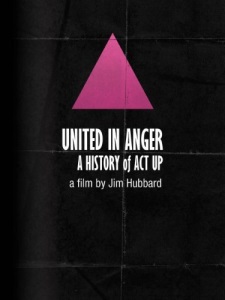United in Anger: A History of ACT UP (2012)
March 25, 2022 6:03 PM - Subscribe
United in Anger: A History of ACT UP is a documentary about the birth and life of the AIDS activist movement from the perspective of the people fighting the epidemic in New York, USA.
Using oral histories of members of ACT UP, as well as archival footage, the film depicts the efforts of ACT UP as it battles corporate greed, social indifference, and government neglect.
The film takes the viewer through the planning and execution of a half dozen major actions including Seize Control of the FDA, Stop the Church, and Day of Desperation, with a timeline of many of the other actions that forced the U.S. government and mainstream media to deal with the AIDS crisis. It reveals the group's complex culture - meetings, affinity groups, and approaches to civil disobedience mingle with profound grief, sexiness, and the incredible energy of ACT UP.
United in Anger was directed by Jim Hubbard and produced by Hubbard and Sarah Schulman. The filmmakers have deliberately made United in Anger available to watch for free on Kanopy and YouTube, and they encourage high schools and colleges to show the film to students for free - there's a study guide available on the film's website.
The film builds on Hubbard and Schulman's work in the ACT UP Oral History Project, which they founded together in 2001. It's been followed recently by Schulman's extraordinary written history, Let the Record Show: A political history of ACT UP New York, 1987-1993 (2021).
Using oral histories of members of ACT UP, as well as archival footage, the film depicts the efforts of ACT UP as it battles corporate greed, social indifference, and government neglect.
The film takes the viewer through the planning and execution of a half dozen major actions including Seize Control of the FDA, Stop the Church, and Day of Desperation, with a timeline of many of the other actions that forced the U.S. government and mainstream media to deal with the AIDS crisis. It reveals the group's complex culture - meetings, affinity groups, and approaches to civil disobedience mingle with profound grief, sexiness, and the incredible energy of ACT UP.
United in Anger was directed by Jim Hubbard and produced by Hubbard and Sarah Schulman. The filmmakers have deliberately made United in Anger available to watch for free on Kanopy and YouTube, and they encourage high schools and colleges to show the film to students for free - there's a study guide available on the film's website.
The film builds on Hubbard and Schulman's work in the ACT UP Oral History Project, which they founded together in 2001. It's been followed recently by Schulman's extraordinary written history, Let the Record Show: A political history of ACT UP New York, 1987-1993 (2021).
You are not logged in, either login or create an account to post comments

I particularly loved how the filmmakers' political commitment to coalition politics shines through the techniques they've used in the film itself. Things like prioritising contemporaneous footage. Not including a Voice of God narrator. Leaving interpretations of events to the participants. Including a huge range of voices in the choice of interviewees AND in the selection of footage from protests and meetings. Bringing the voices of women, poor people and people of colour to the fore. Showing explicitly how ACT UP benefited from the knowledge and experience they brought from other movements. In the book she describes the difficulty they had getting funding for the film as a result: "... we were told over and over that a documentary film has to have four to six characters the viewer can follow on a 'journey'. Jim explained repeatedly that if we conformed to this, we would be distorting the history, because the successes and failures of ACT UP and AIDS activism were attributable not to indivudals but to the group. We were denied funding every time." She says most of the funding ended up coming from individual donations.
I also thought it was interesting that in the book she explicitly positions the film as a counterpoint to David France's film How to Survive a Plague (Fanfare page here!) She argues that France's film "visually and formally argues for an understanding of AIDS activism on the heroic white male individual model, since he did subscribe to the four-to-six characters prescription, while Jim's film... argues that the success of the movement was, by contrast, a consequence of the profound range of difference in the large groups relationships that produced the AIDS coalition." You can see France and Hubbard in conversation about their films on YouTube here.
posted by happyfrog at 7:07 PM on March 25, 2022 [3 favorites]